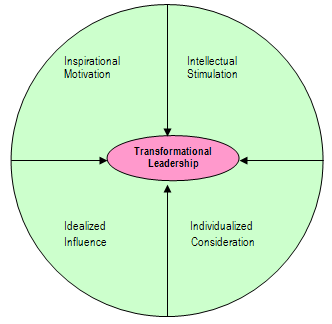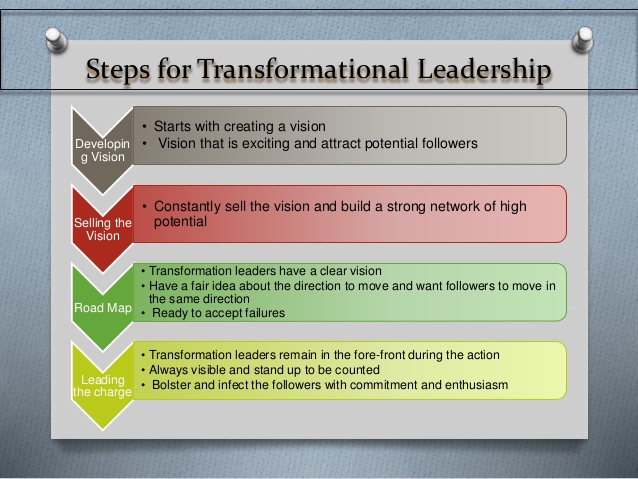Transformational Theories of Leadership Focus on Which of the Following
Global Tech News Daily. Because of this the leader must provide some form of extrinsic motivation for the follower.

Transformational Leadership Theory Meaning Criticisms And Its Implications
Transformational leaders focus on.

. In this report leadership style of Steve Jobs will be evaluated in the light of two popular theories of leadership. Transactional theory and Transformational theory. It was noted that followers showed higher job satisfaction adaptability to change acquisition acceptance and job performance under a transformational leader.
Charisma individualized consideration inspirational motivation and intellectual stimulation. Transactional leadership theories assume that the desires of the leader and the desires of the follower are not the same. Transformational leadership is the new leadership paradigm as it focuses on charismatic and affective leadership elements PSU WC.
E The path-goal theory represents a laissez-faire approach to leadership. But transformational leadership theory has emerged as a way to understand the unique qualities of a motivational leader. The Transformational Leadership Theory 416 Words 2 Pages The Transformational Leadership theory states that this process is by which a person interacts with others and can create a solid relationship that results in a high percentage of trust that will later result in an increase of motivation both intrinsic and extrinsic in both leaders and follower.
Transformational Leadership consists of 4 four dimensions. Bass later developed the concept of transformational leadership further. The aim of the transformational leader is to promote intrinsic motivation.
What most people overlook is the time and effort required to fully understand and apply ANY leadership style let alone one as dynamic and powerful as transformational leadership. Transformational managers usually create a high-performance workforce which engages his peers to do activities outside the job role and encourage in. D The theory proposes that leaders must work closely with followers throughout.
C The theory considers removing obstacles to be a component of effective leadership. Which of the following would be the strongest current indicator of inspirational leadership by Howard Schultz of Starbucks. Transactional leadership is the most widespread as far as it is connected with the organization of the working process goal setting and extrinsic motivation.
The Transformational Leadership Theory 19 focuses on the relationship between leaders and followers and describes the kind of leader who is inspirational and charismatic. Transactional leadership theory Instead of giving importance to the character of the people Trait theory or on the situation Contingency theory Transactional leadership theory emphasizes on the procedure of. Transformational and transactional leadership theories represent two most popular approaches to leadership.
The followers of such leaders demonstrate high levels of job satisfaction and organizational commitment and engage in organizational citizenship. Create a European espresso bar concept b. It is seen as a very positive theory yet basic in many forms this form of leadership is quite essential although strengths and weaknesses are found within the theory.
It fits closely with. Transformational leadership theory is the most widely studied of all theories of effective leadership. Transformational leadership theory promotes a style of guidance that emphasizes motivating employees and creating a vision and encouraging them to fulfill it.
Transformational leadership style is characteristic of leaders who focus on supervision and organizational goals achieved through a system of rewards and punishments. Transformational leadership is also useful for virtual teams. Relationship theories also known as transformational theories focus upon the connections formed between leaders and.
One of the most important theories to take notice of is the relationship theory. Both transformational leadership and servant leadership emphasize the importance of appreciating and valuing people listening mentoring or teaching and empowering followers. According to his 1985 book Leadership and Performance Beyond Expectations this kind of leader displays the following characteristics.
Implications of Transformational Leadership Theory. They increase the motivation morale and performance of the followers. Transformational leaders are the type of leaders who bring change in the individuals and the organizational structure.
Although the setting of goals has been emphasized to be one of the most important tasks of leaders eg Tett et al 2000 goals and leadership have commonly been considered from two relatively independent research perspectives cf. Transformational leadership is most useful when an organisation is going through a major change Nemanich Keller 2007. He defined transformational leadership as a process where leaders and their followers raise one another to higher levels of morality and motivation 1 Bernard M.
The current environment characterized by uncertainty global turbulence and organizational instability calls for transformational leadership to prevail at all levels of the organization. Berson et al 2015In the field of goal research many efforts centered on the setting of goals in organizational. B The theory proposes only a passive and supportive role for leaders.
Without this the follower will not want to do what the leader desires. Transformational leadership is a leadership theory where a leader works with followers to identify the changes needed create a vision through inspiration and execute the change with a group of highly committed followers. The fundamental skills of a transformational leader include being able to mobilize employees inspire them and boost their morale.
Transformational Theory Page Psy 532 Psychological Foundations Of Leadership Dobbs Confluence


Comments
Post a Comment